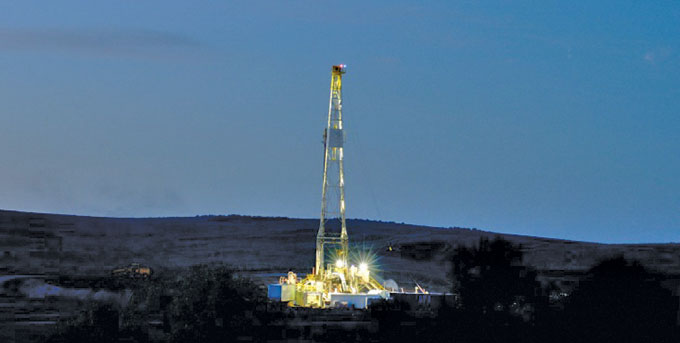Next story: The Sins of the Father
UB Shale Institute Taps Industry Shills
by Buck Quigley

On Tuesday, the State University of New York at Buffalo’s Shale Resources and Society Institute issued its first report, “Environmental Impacts During Shale Gas Drilling: Causes, Impacts and Remedies.” In a nutshell, the paper argues that mistakes learned from high-volume horizontal hydro-fracturing accidents in Pennsylvania would not be repeated in New York State, given the appropriate industry regulation. It’s a pro-fracking piece.
According to UB’s press release, “the institute conducts and disseminates peer-reviewed research that can help guide policymakers on issues relating to hydraulic fracturing.”
One of the authors of the report, John P. Martin, is co-director of the institute. He was widely quoted in media reports claiming “the study was funded entirely by the University at Buffalo with no industry support.” (This includes the amended version of an initially wholly uncritical report on the study in the Buffalo News, which was changed after Artvoice posted the information you’re about to read.) The claim is not true, according to UB spokesperson John Della Contrada.
Della Contrada told us a few weeks back that “philanthropic support [for the institute] is pending from a variety of potential funders.” Tuesday, we left a message asking him about the new report. He sent a three-word email reply. “Funded by UB.” We asked for a little more clarity. He then confirmed that the new report wasn’t funded by UB, but in fact the money came from the University at Buffalo Foundation.
Since the various UB Foundations exist beyond the reach of the Freedom of Information Law, the public can’t know which gas industry companies may or may not have donated to the UB Foundation, or the amount of those donations. All we’re told is the money for the study came from the UB Foundation. Isn’t that a nice way to launder money, my fellow New Yorkers?
Well, at least the State University of New York at Buffalo is standing by the research coming out of its new institute, right? Check out the following disclaimer found on page 2 of the report released today:
The opinions and conclusions expressed or implied in the report are those of the authors and do not necessarily reflect those of the University at Buffalo. University at Buffalo does not make any warranty, expressed or implied, or assume any legal liability or responsibility for the accuracy, completeness, or usefulness of any information, apparatus, product, or process disclosed, or represents that its use would not infringe upon privately owned rights. Trademarks and copyrights mentioned with this report are the ownership of their respective companies.
Two of the other authors of the new UB report are Robert W. Watson and Timothy J. Considine. They have a proven track record of producing feel-good fracking stories funded by pro-fracking groups—and they published them on Penn State letterhead.
“The Economic Impacts of the Pennsylvania Marcellus Shale Natural Gas Play: An Update” was published on May 24, 2010. It too came with a disclaimer:
This report was prepared as an account of work sponsored by the Marcellus Shale Coalition. Neither the Department of Energy and Mineral Engineering at Penn State nor the Marcellus Shale Coalition, nor any person acting on behalf thereof, makes any warranty or representation, express or implied, with respect to the accuracy, completeness or usefulness of the information contained in the report nor that its use may not infringe privately owned rights, or assumes any liability with respect to the use of, or for damages resulting from the use of, any information, apparatus, method or process disclosed in this report. This report was written and produced for the Marcellus Shale Coalition by the Department of Energy and Mineral Engineering, Penn State University. The opinions, findings, and conclusions expressed in the report are those of the authors and are not necessarily those of The Pennsylvania State University or the Marcellus Shale Coalition.
I left messages with Watson and Considine regarding the funding of this report, but heard nothing back.
What exactly is the Marcellus Shale Coalition? Could it be some grassroots group of concerned landowners? No.
According to its website, the Marcellus Shale Coalition counts 44 gas industry companies on their board. Names like Cabot, Chesapeake, Chevron, EQT, Hess, Range Resources, Seneca Resources, Shell Appalachia, and so on. The list of associate members stretches to over 250 companies with names like Halliburton Energy Services, and Drill Baby Drill Staffing.
The executive board comprises chair Dave Spigelmyer (Chesapeake Energy Corporation); the vice chair Rob Broen (Talisman Energy USA); the treasurer K. Scott Roy (Range Resources Corporation); the secretary John Mollenkopf (MarkWest Energy Partners, L.P.); the COO Randy Albert (CNX Gas Company, LLC); and four others from various energy companies.
The reports that Watson and Considine published through Penn State—which were “works for hire” funded by the Marcellus Shale Coalition—were widely questioned. Notably, Considine claimed between 83,000 and 200,000 jobs would be created in Pennsylvania. Meanwhile, the Pennsylvania Department of Labor estimated 13,000 new jobs from shale gas drilling. Considine since has left Pennsylvania for Wyoming, where he has authored positive papers related to coal mining, and now fracking in New York State.
blog comments powered by Disqus|
Issue Navigation> Issue Index > v11n20 (Week of Thursday, May 17) > Week in Review > UB Shale Institute Taps Industry Shills This Week's Issue • Artvoice Daily • Artvoice TV • Events Calendar • Classifieds |









 Current Issue
Current Issue